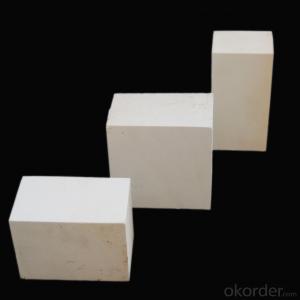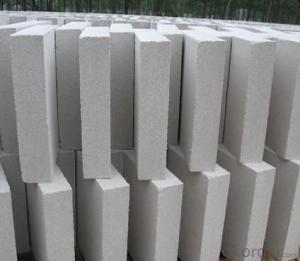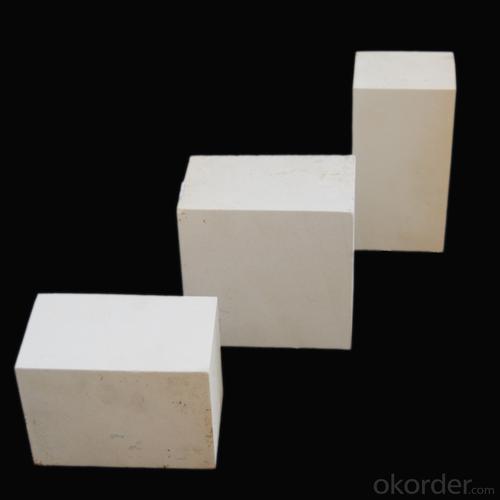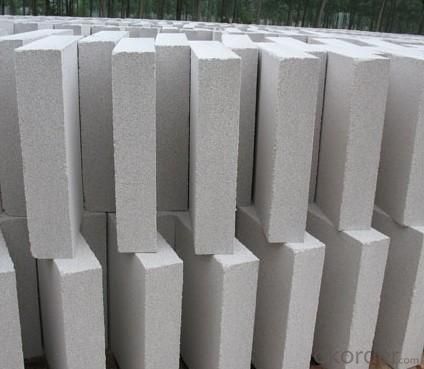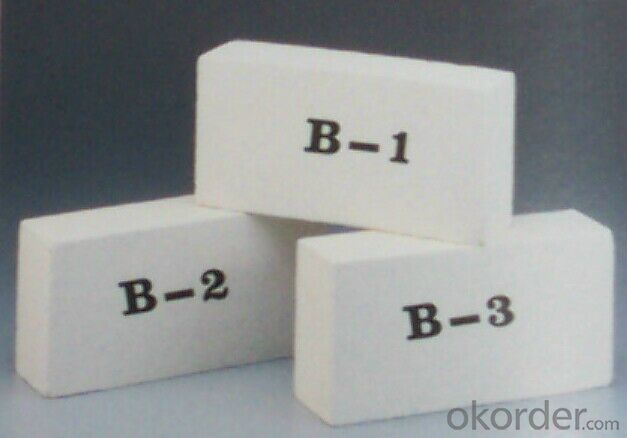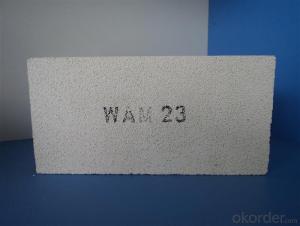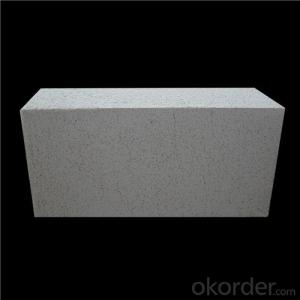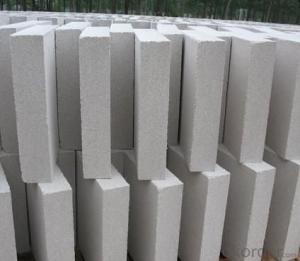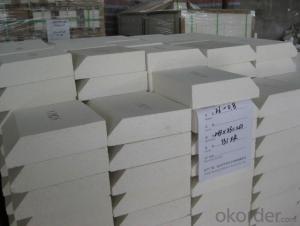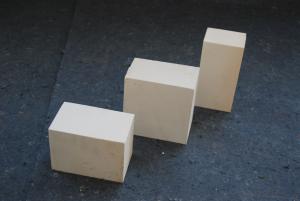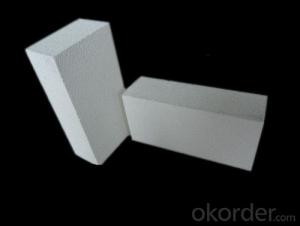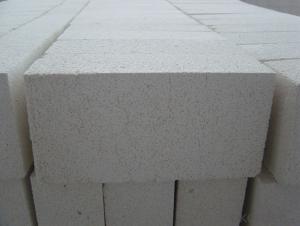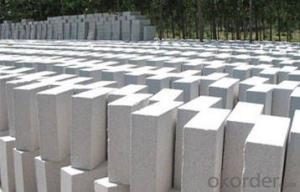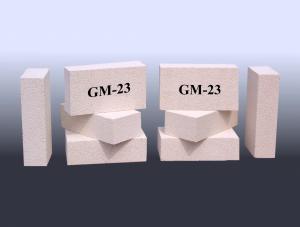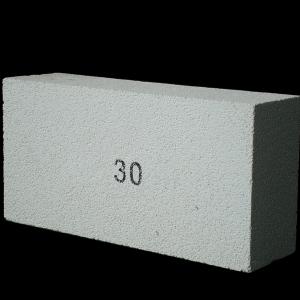Insulating Fire Brick - Refractory JM Mullite Insulation Brick B-7
- Loading Port:
- Shanghai
- Payment Terms:
- TT OR LC
- Min Order Qty:
- 10 m.t.
- Supply Capability:
- 1000 m.t./month
OKorder Service Pledge
OKorder Financial Service
You Might Also Like
Refractory mullite insulating refractory brick JM 23
Okorder series heat insulation brick
Okorder series thermal insulation brick is an effective, energy saving, low carbon, environmental protection advanced, according to the ASTM standard manufacturing products. Okorder series products are best Li Ning and insulation in all types of industrial furnaces in the metallurgical field, aluminum, petrochemical, electric power and glass ceramic materials. They can be used as part of the working layer of thermal insulation or non - melting. Products have been widely used in the following furnace, achieved satisfactory results.
Application of heat preservation brick
Metallurgical Industry: blast furnace, hot blast furnace, heating furnace, etc..
Petrochemical Industry: ethylene cracking furnace, hydrogen production furnace, primary reformer, heating furnace, etc..
Ceramic industry: roller kiln, kiln, etc..
Glass industry: glass furnace regenerator, etc.
Carbon industry: carbon furnace, etc..
Aluminum electrolysis industry: aluminum reduction cell, etc.
Other industries: tunnel kiln, shuttle kiln, etc..
Advantages of heat insulation brick
Low thermal conductivity: more porosity will bring good thermal insulation effect, energy saving.
High crushing strength: high crushing strength, volume stability.
Low heat storage: small heat storage to absorb more heat, energy-saving effect is obvious.
Gao Chundu: iron, alkali metal impurity content is low.
The precise size: Brick size processing precision, special shape cutting and grinding, accelerate the brickwork.
Insulating brick picture
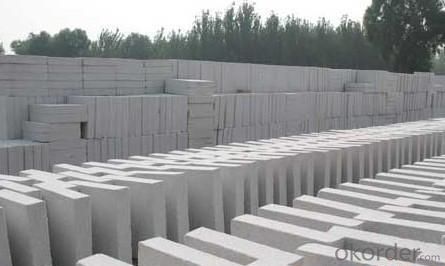
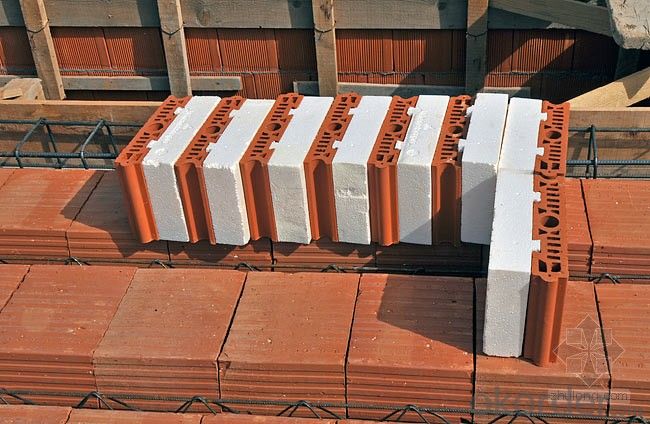
Common problem solutions
1. What products do you have?
We have all kinds of refractory bricks, refractory casting materials, mortar, cement, ceramic fiber products, etc..
Or you can browse our products to choose what you need.
2. How to control product quality?
With strict quality control system throughout the material selection and production process, we have the quality of refractory materials and ceramic fiber products to meet customer requirements.
From the selection of raw materials, the quality of our control to start. The quality certificate of the raw material is required, each batch of the products are to be tested in the use of the forward line. In the production process, the quality control by the workers, and then each piece of classification, and through the quality supervision and inspection.
3. Can you give me a brief introduction to the application of your product?
My company is mainly engaged in refractories in the steel, cement, glass, ceramics, petrochemical, electric power and other industries.
4. What information do you need if I need you?
In order to select the right products, we will provide us with information, such as the United States, technical data, order quantity, product application, etc..
If you have any questions, please contact us.
- Q: Can insulating fire bricks be used in refractory linings for boilers?
- Yes, insulating fire bricks can be used in refractory linings for boilers. Insulating fire bricks are specifically designed to have low thermal conductivity, which makes them ideal for applications where heat insulation is required. In boiler systems, insulating fire bricks can be used to line the walls, roof, and floor of the combustion chamber, as well as the flue gas passages. By using insulating fire bricks in these areas, the heat loss from the boiler can be minimized, resulting in improved energy efficiency. Additionally, insulating fire bricks are lightweight and easy to install, making them a convenient choice for boiler refractory linings.
- Q: Are insulating fire bricks resistant to acid attack?
- Yes, insulating fire bricks are resistant to acid attack.
- Q: Can insulating fire bricks be used in the construction of metal smelting molds?
- Yes, insulating fire bricks can be used in the construction of metal smelting molds. Insulating fire bricks are designed to withstand high temperatures and provide excellent thermal insulation, making them suitable for use in metal smelting molds where heat retention is crucial.
- Q: How do insulating fire bricks compare to other types of refractory materials?
- IFBs, or insulating fire bricks, are refractory materials specially designed for their high insulating properties. They have several advantages when compared to standard fire bricks or castable refractories. First and foremost, IFBs have lower thermal conductivity than other refractory materials. This means they are more effective at preventing heat loss and providing insulation for high-temperature applications. Their low thermal conductivity allows them to retain heat within furnaces or kilns, resulting in reduced energy consumption and improved efficiency. Additionally, IFBs are lightweight, making them easier to handle, transport, and install. Their lightweight nature also reduces the overall weight of the refractory lining, which can be advantageous in certain situations. Another benefit of IFBs is their ability to withstand rapid temperature changes. They exhibit good thermal shock resistance, meaning they can endure sudden temperature fluctuations without cracking or spalling. This property is particularly valuable in applications with frequent heating and cooling cycles. Furthermore, IFBs possess a high level of chemical resistance. They can withstand corrosive environments and chemical attacks, making them suitable for various applications involving acids, alkalis, and other aggressive substances. However, IFBs do have limitations. Their lower density compared to standard fire bricks means they are less durable and have lower mechanical strength. Therefore, they might not be suitable for applications that require high load-bearing capacity or are prone to heavy abrasion. To summarize, IFBs offer excellent thermal insulation, lightweight properties, good thermal shock resistance, and high chemical resistance. Nonetheless, their lower density and reduced mechanical strength may restrict their usage in certain scenarios. It is crucial to carefully consider the specific requirements of the application before selecting IFBs or alternative refractory materials.
- Q: Are insulating fire bricks suitable for use in incinerators?
- Indeed, insulating fire bricks are well-suited for utilization in incinerators. Tailored specifically to endure elevated temperatures and offer exceptional insulation qualities, these bricks prove to be ideal for incinerators. They exhibit remarkable resistance to thermal shock, ensuring their structural integrity remains intact even under extreme heat exposure. Moreover, these bricks possess low thermal conductivity, which aids in diminishing heat loss and enhancing the overall energy efficiency of the incinerator. The combination of their heat endurance and insulation effectiveness renders them a dependable option for incinerator utilization.
- Q: What is the typical porosity of an insulating fire brick?
- The specific type and composition of an insulating fire brick influence its typical porosity, which can vary. Generally, insulating fire bricks have a porosity range of 40% to 70%. Porosity refers to the presence of open space or voids within the brick structure, which enhances its thermal insulation properties by minimizing heat transfer. The brick's insulation capability improves as its porosity increases. Manufacturers of insulating fire bricks typically target a specific porosity range to achieve the desired thermal conductivity and insulation efficiency.
- Q: Are insulating fire bricks resistant to acid attack?
- Yes, insulating fire bricks are resistant to acid attack.
- Q: Can insulating fire bricks be used in high-temperature ducts?
- Insulating fire bricks can indeed be used in high-temperature ducts. These bricks are specially designed to withstand extreme temperatures, making them an ideal choice for applications where heat retention and insulation are crucial. With their low thermal conductivity and high resistance to thermal shock, insulating fire bricks can effectively trap heat within the ducts, preventing any loss of energy and ensuring efficient heat transfer. Additionally, their lightweight nature makes them easy to install and handle, while their durability allows them to withstand the harsh conditions of high-temperature environments. Overall, insulating fire bricks are a reliable and effective solution for insulating high-temperature ducts.
- Q: Are insulating fire bricks suitable for insulation in gas turbines?
- Insulating fire bricks are not typically suitable for insulation in gas turbines. While they are excellent for high-temperature insulation applications, such as in furnaces and kilns, gas turbines operate at even higher temperatures and require specialized insulation materials. Gas turbines typically utilize thermal barrier coatings, ceramic fiber blankets, or other advanced insulation materials that can withstand the extreme heat and pressure conditions within the turbine. These materials are specifically engineered to provide excellent thermal insulation while also offering other properties such as erosion resistance, low thermal conductivity, and high mechanical strength. Therefore, while insulating fire bricks have their merits in certain applications, they are not the ideal choice for insulation in gas turbines.
- Q: Can insulating fire bricks be used in waste incineration plants?
- Yes, insulating fire bricks can be used in waste incineration plants. These bricks are designed to withstand high temperatures, making them suitable for lining the combustion chambers and other areas where intense heat is generated in waste incinerators. Additionally, their insulating properties help to reduce heat loss and increase energy efficiency in the incineration process.
Send your message to us
Insulating Fire Brick - Refractory JM Mullite Insulation Brick B-7
- Loading Port:
- Shanghai
- Payment Terms:
- TT OR LC
- Min Order Qty:
- 10 m.t.
- Supply Capability:
- 1000 m.t./month
OKorder Service Pledge
OKorder Financial Service
Similar products
Hot products
Hot Searches
Related keywords
